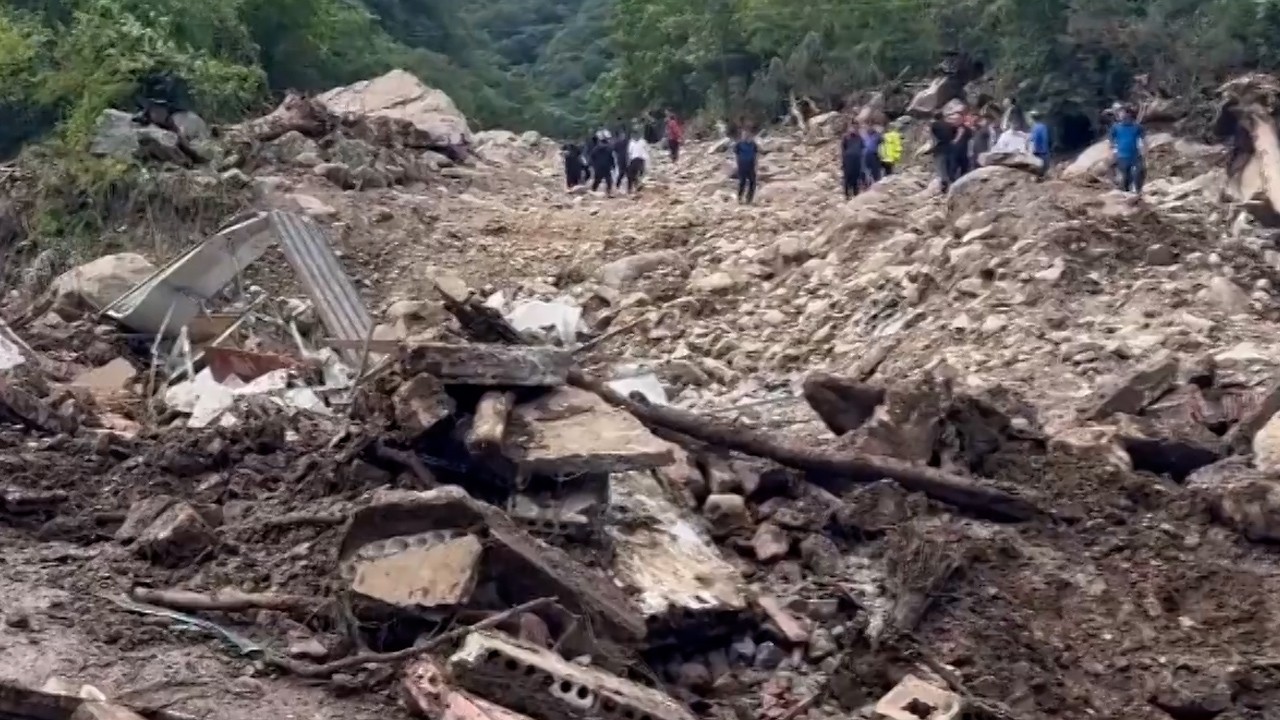
Xi Jinping urges speed in China’s rush to recover from devastating floods
- At a Politburo Standing Committee meeting on Thursday, the Chinese leader called for a strengthening of recovery and reconstruction efforts
- Food security must be ensured and insurance payments speeded up for the millions affected by flooding, Xi said
Xi said food security must be ensured and insurance payments speeded up, and he urged officials to make good use of disaster relief funding in the wake of Typhoon Doksuri, which swept through large parts of China earlier in August.
Close to 4 million people were affected by the consequent floods, which caused more than 30 deaths in northern China. Dozens of people are still missing.
According to state-run news agency Xinhua, Xi made the remarks on Thursday, while presiding over a meeting of the Politburo’s seven-strong Standing Committee – the decision-making body’s inner circle.
Xi, who is also the paramount leader of China’s ruling Communist Party and chief commander of the country’s vast military force, was last seen in public on July 31, when he hosted an annual promotion ceremony in Beijing for generals.
Hailing China’s latest phase of flood prevention and disaster relief effort as a “significant achievement”, the Standing Committee urged local governments to make good use of disaster relief funds to speed up recovery and reconstruction.
The meeting ordered more effort to repair damaged infrastructure, as well as farmland and agricultural facilities, as soon as possible. Increased supplies of farming materials are also needed to minimise agricultural losses and ensure national food security, Xinhua said.
The leadership also called for the speedy restoration and reconstruction of public facilities such as schools, hospitals, and nursing homes, as well as people’s homes, with an eye on the approaching winter.
The push is intended to ensure that people – especially the elderly – affected by the disaster can return to their homes or move into new housing before the onset of cold weather, as well as get students back to school on time, according to Xinhua.
Financial institutions were told to simplify their procedures to strengthen credit support and insurance claims for disaster-stricken areas to tide affected people and business entities over the difficulties.
But the leadership also warned that now is “not the moment to relax”. China is still in its main floods season, with torrential rainstorms, typhoons and flooding still frequent occurrences in many parts of the country.
Many parts of northern and northeast China’s soil is water-soaked, resulting in high risk of mountain torrents and geological disasters. There is also still a risk of flooding in some river basins.
The meeting called for decisive actions to evacuate and relocate people from dangerous areas at critical moments. “It is better to be ready at every time than unprepared for just once”, the Standing Committee said, according to Xinhua.
Local authorities were ordered to further refine their disaster evacuation plans to make sure that everyone who needs to leave can be transferred to safety in a timely manner.
The Standing Committee also urged a speeding up of improvements in flood-control engineering systems, especially in the major river basins in northern China, as well as for a strengthened planning and building capacity around flood controls and city drainage systems.
Thousands forced from homes in Hebei to ease flooding in Beijing
Many Chinese internet users questioned the handling of the floods after suggestions that affected neighbouring provinces should make the protection of the capital Beijing one of their priorities, as northern China was hit by historic rainfall and flooding.
Ni Yuefeng, party boss of Hebei province, which borders Beijing, attracted criticism online when he called for the province’s cities to “resolutely play a good role of moat for the capital”.
China’s water resources minister Li Guoying made similar remarks about protecting the Xiongan New Area and Beijing Daxing International Airport, the 80 billion yuan (US$11.1 billion) facility south of the capital that opened in 2019.
Typhoon Doksuri also hit China’s northeastern provinces of Heilongjiang, Jilin and Liaoning.
Known as the country’s breadbasket, together they contributed more than one-fifth of China’s grain production, a quarter of its grain commodities, and one-third of its grain exports last year, according to data from the State Council.
Farmers across the region are pleading for help after floods swept away crops and damaged many agricultural facilities. The aftermath of the disaster is expected to be soaring insect numbers and crop blight.
China’s official media routinely provide readouts of Politburo meetings, which usually occur in the last week of each month. However, it is uncommon for them to report on the more secretive Standing Committee discussions.
These are held on a more ad hoc basis, usually in response to major incidents and urgent matters. The Standing Committee’s previous two meetings – in February and November – were critical, with the taking of the decision to end China’s zero-Covid policies.




.jpg?itok=t8OJmsoF)